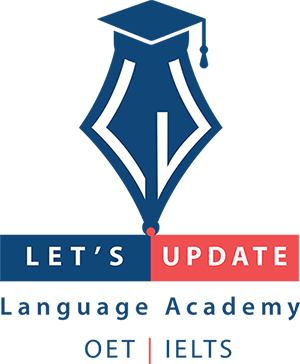The OET Listening sub-test is an important part of the overall exam, designed to assess your ability to understand spoken English in the complex and demanding context of a healthcare setting. To succeed in this part, a systematic approach paired with consistent practice is required.
Understanding the OET Listening Format
The OET Listening Test is divided into three sections, each of which presents a unique challenge and requires specific listening skills:
Part A: Consultation Extracts
This part takes you through authentic doctor-patient interactions. You will listen to two consultations and take detailed notes based on the materials provided. The emphasis is on understanding the patient’s concerns, medical history, symptoms, the doctor’s examination results, diagnosis, treatment plan, including medications and dosages, and any necessary follow-up actions. Furthermore, you may be asked to assess the doctor’s tone, attitude, and overall dynamics of the conversation.
Part B: Short Workplace Extracts
This section introduces you to brief interactions between healthcare experts in various workplace environments. You will listen to six short extracts and complete multiple-choice questions about the information presentation. The emphasis is on understanding the key ideas, identifying minute details, recognizing the speakers’ roles and relationships, determining underlying meanings, and identifying the overall purpose of the conversation.
Part C: Longer Monologues or Presentations
This part consists of listening to two longer pieces of audio, such as lectures or presentations on healthcare-related topics. You will respond to questions on the key ideas, supporting details, particular information, the general goal of the presentation, and the speaker’s attitude or perspective. The capacity to recognize main ideas, follow complex arguments, and understand the speaker’s use of language and rhetorical tactics is essential.
Developing Effective Listening Strategies
Expand your accent range: Expose yourself to a variety of English accents by watching news programs, documentaries, podcasts, and movies from various English-speaking nations. This can help you understand speakers with different dialects and accents, increasing your ability to adapt during the exam.
Master medical terminology: Develop a strong medical vocabulary by reading medical textbooks, online resources, and healthcare-related literature. A strong medical vocabulary will help you better understand the healthcare-specific language and terminology used in the listening extracts.
Develop efficient note-taking skills: Take brief and organized notes while listening to various audio materials. Concentrate on capturing vital information, using acronyms, and including visual aids whenever possible. Taking good notes will help you remember essential information during the exam.
Prioritize regular listening practice: Regular exposure to spoken English is essential for developing listening comprehension. Include listening practice in your everyday routine by listening to news, podcasts, audiobooks, and healthcare-related audio resources.
Master time management: Set aside enough time during the exam to correctly answer all questions. Use time management skills to avoid rushing or missing essential information.
Develop critical listening skills: Pay attention to the speaker’s tone of voice, intonation, and nonverbal cues to determine their attitude, emotions, and hidden meanings. This will help you interpret the information more properly and effectively.
Practice paraphrasing: Develop the capacity to paraphrase information in your own terms, which can help in understanding complicated concepts and remembering crucial points.
Tips for Each Part of the Listening Test
Part A: Consultation Extracts
- Focus on understanding the patient’s perspectives, concerns, and medical history.
- Pay close attention to the doctor’s examination procedures, findings, diagnosis, and treatment plan.
- Take down particular information, such as prescriptions, dosages, follow-up appointments, and any recommendations.
- Be aware of the doctor’s tone and attitude to gain a better understanding of the consultation.
Part B: Short Workplace Extracts
- Identify the speaker’s roles, relationships, and the context of the interaction.
- Listen to the conversation’s goal and context.
- Pay attention to specific details such as hours, dates, locations, names, and any actions that must be taken.
- Figure out the underlying meanings and implied information.
Part C: Longer Monologues or Presentations
- Predict the topic based on its title or introduction.
- Identify the key points, supporting arguments, and examples.
- Take note of the speaker’s arrangement, use of language, and rhetorical strategies.
- Understand the speaker’s attitude, perspective, and intent.
Additional Tips for Success
Practice regularly: Consistent practice is essential for strengthening your listening abilities. Use practice tests and materials to imitate exam conditions.
Use available resources: Make use of online resources, practice materials, and sample tests to help you prepare.
Join a study group: Collaborate with other OET candidates to share tips, practice, and offer mutual support.
Seek professional guidance: Consider enrolling in an OET preparation course for expert advice and personalized help.
By combining tactics with consistent practice, you can greatly improve your OET listening performance and boost your chances of receiving the target score. Remember that effective listening requires active participation, attentiveness, and intelligent note-taking. Let’s Update Language Academy stands tall as the leading OET Coaching Center Ernakulam. The academy, known for its remarkable track record and commitment to student achievement, provides the best OET and IELTS training in Kochi with other comprehensive training programs targeted at the unique needs of global professions. Let’s Update’s team of highly skilled and experienced instructors creates a supportive learning atmosphere that enables students to obtain their targeted OET scores and launch successful global careers.

